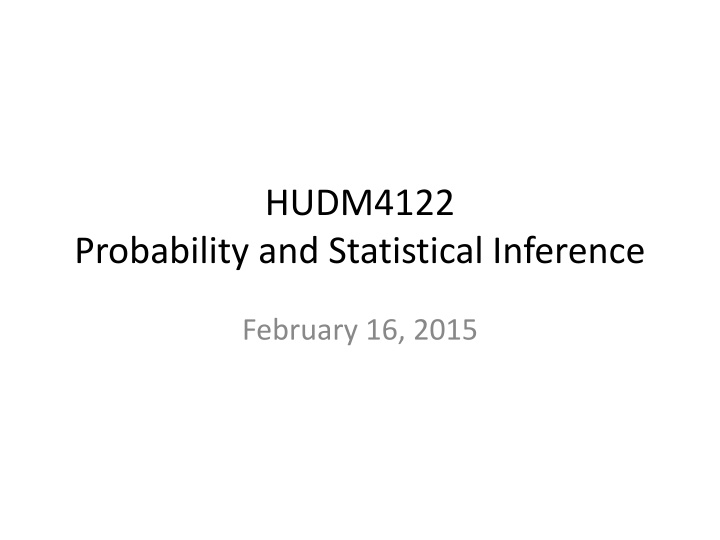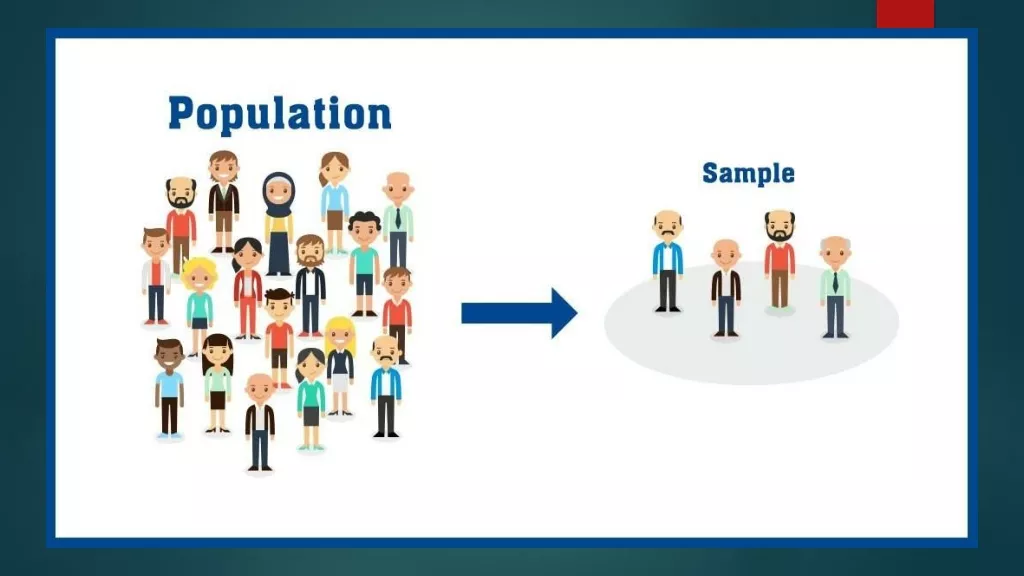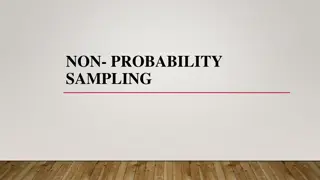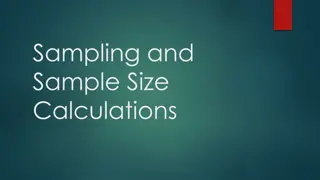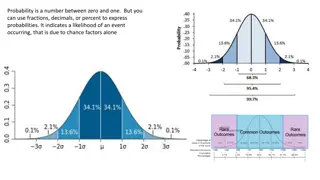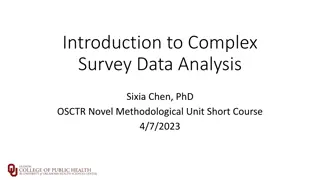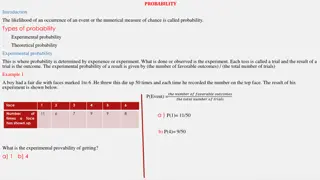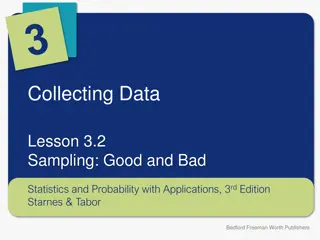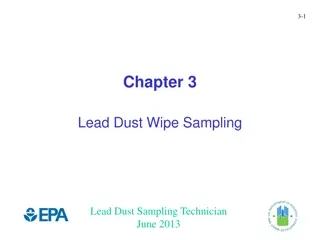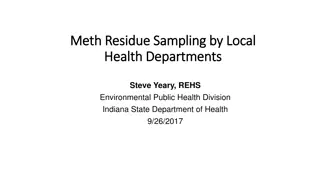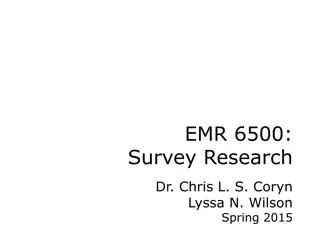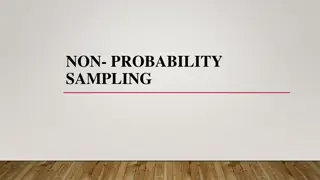Sampling for Tickets Probability Problem
The content covers a probability problem involving sampling without replacement to win tickets to a Justin Bieber concert. The solution is computed for the probability of winning tickets on exactly one day out of five. It discusses the distinction between two different problems - one involving sampling without replacement and the other the sum of five independent events.
Download Presentation

Please find below an Image/Link to download the presentation.
The content on the website is provided AS IS for your information and personal use only. It may not be sold, licensed, or shared on other websites without obtaining consent from the author.If you encounter any issues during the download, it is possible that the publisher has removed the file from their server.
You are allowed to download the files provided on this website for personal or commercial use, subject to the condition that they are used lawfully. All files are the property of their respective owners.
The content on the website is provided AS IS for your information and personal use only. It may not be sold, licensed, or shared on other websites without obtaining consent from the author.
E N D
Presentation Transcript
HUDM4122 Probability and Statistical Inference February 16, 2015
In the last class We started Ch. 4.4 in Mendenhall, Beaver, & Beaver
Today Ch. 4.4-4.6 in Mendenhall, Beaver, & Beaver
Today Sampling without Replacement Permutations Combinations Independence Conditional Probability
We ended last class with this problem I call a radio station, where they make me pick a number between 1 and 10 If I get today s winning number, I get free tickets to hear Justin Bieber (oh lucky me) Let s say I call 5 days in a row What is the probability I get tickets on exactly one day? (my daughter will still be excited)
Solution A (professor) 1 1 9 1 9 9 10+ + 10 10 10 9 10 9 10 10 10 1 9 9 + 10 1 10 10 9 10 10 9 10 9 + 10 = 0.40951
Solution B (class) 1 (9 10)4 5 10 = 0.32805
These represent two different problems One (my solution) is sampling without replacement The other is the sum of five independent events So which one is right?
Lets first compute the sample space I call a radio station, where they make me pick a number between 1 and 10 I call 5 days in a row 10*10*10*10*10 = 100,000
Lets first compute the sample space I call a radio station, where they make me pick a number between 1 and 10 I call 5 days in a row 10*10*10*10*10 = 100,000 A.K.A. too many to list out
Lets first compute the sample space I call a radio station, where they make me pick a number between 1 and 10 I call 5 days in a row 10*10*10*10*10 = 100,000 A.K.A. too many to list out Or is it?
bieber-tix-example.xlsx 0.32805
So, the professor was wrong It turns out sleep deprivation is bad for cognition
So, the professor was wrong It turns out sleep deprivation is bad for cognition Don t try this on your midterm
So why was this correct? 1 (9 10)4 5 10
5 days to win 1 ticket 1 (9 10)4 5 10 5 days CXXXX XCXXX XXCXX XXXCX XXXXC
In each of 5 days, 1 answer where right 1 (9 10)4 5 10 5 days Correct answer
And 4 more days where wrong; and there are 9 wrong answers Wrong days 1 (9 10)4 5 10 5 cases Correct answer Wrong answers
Each day is independent from other days that s why this is the correct math Wrong days 1 (9 10)4 5 10 5 cases Correct answer Wrong answers
The sample space for multi-stage data collection can be calculated using The Extended mn rule
The Extended mn rule Let s say you have k stages of your data collection
The Extended mn rule Let s say you have k stages of data collection Unlike the book, I don t call it an experiment, because that term is usually given a more specific meaning by researchers
The Extended mn rule Let s say you have k stages of data collection And there are n1 ways to accomplish the first stage And n2 ways to accomplish the 2nd stage And n3 ways to accomplish the 3rd stage And nk ways to accomplish the kth stage Then the sample space = n1 * n2 * n3 * nk
Any questions about the Extended mn rule? Let s say you have k stages of data collection And there are n1 ways to accomplish the first stage And n2 ways to accomplish the 2nd stage And n3 ways to accomplish the 3rd stage And nk ways to accomplish the kth stage Then the sample space = n1 * n2 * n3 * nk
Note that there doesnt have to be the same probability in each stage!
This can come in useful in cases that are not truly independent Unlike the Justin Bieber example
Independence Two events A and B are independent if A does not affect B and B does not affect A
Which of these are independent? A B Flipping a fair coin Flipping same fair coin again
Which of these are independent? A B Flipping a fair coin Flipping a biased coin Flipping same fair coin again Flipping same biased coin again
Which of these are independent? A B Flipping a fair coin Flipping a biased coin Bob parties late night before midterm Flipping same fair coin again Flipping same biased coin again Bob falls asleep during midterm
Which of these are independent? A B Flipping a fair coin Flipping a biased coin Bob parties late night before midterm Bob s grade on midterm Flipping same fair coin again Flipping same biased coin again Bob falls asleep during midterm Bob s grade on final
Which of these are independent? A B Flipping a fair coin Flipping a biased coin Bob parties late night before midterm Bob s grade on midterm Bob disrupts class Flipping same fair coin again Flipping same biased coin again Bob falls asleep during midterm Bob s grade on final Bob gets expelled
Which of these are independent? A B Flipping a fair coin Flipping a biased coin Bob parties late night before midterm Bob s grade on midterm Bob disrupts class Bob gets expelled Flipping same fair coin again Flipping same biased coin again Bob falls asleep during midterm Bob s grade on final Bob gets expelled Bob takes job at McDonald s
Which of these are independent? A B Flipping a fair coin Flipping a biased coin Bob parties late night before midterm Bob s grade on midterm Bob disrupts class Bob gets expelled Bob takes job at McDonald s Flipping same fair coin again Flipping same biased coin again Bob falls asleep during midterm Bob s grade on final Bob gets expelled Bob takes job at McDonald s Bob wins lottery
Which of these are independent? A B Flipping a fair coin Flipping a biased coin Bob parties late night before midterm Bob s grade on midterm Bob disrupts class Bob gets expelled Bob takes job at McDonald s Bob wins lottery Flipping same fair coin again Flipping same biased coin again Bob falls asleep during midterm Bob s grade on final Bob gets expelled Bob takes job at McDonald s Bob wins lottery Bob becomes ill due to congenital heart problem
Example of probability calculation with non-independent events Let s say that I invite 6 friends over to play Beer Hunter
This can come in useful in cases that are not truly independent Let s say that 6 friends decide to play Beer Hunter Rules are 6 cans of beer 1 violently shaken before playing and then shuffled Each person chooses a can and opens it
Initial Sample Space = 6 1 Bad outcome 5 Perfectly fine outcomes If you don t like beer, imagine it s root beer
Probability of bad outcome The probability of a bad outcome for friend 1 is 1/6
Probability of bad outcome The probability of a bad outcome for friend 1 is 1/6 But if friend 1 comes out OK The probability of a bad outcome for friend 2 is 1/5, not 1/6!
Probability of bad outcome The probability of a bad outcome for friend 1 is 1/6 But if friend 1 comes out OK The probability of a bad outcome for friend 2 is 1/5, not 1/6! Does everyone see why?
Probability of bad outcome The probability of a bad outcome for friend 1 is 1/6 But if friend 1 comes out OK The probability of a bad outcome for friend 2 is 1/5, not 1/6! Does everyone see why? Friend 1 already opened a beer can, and it went ok This only leaves 5 closed beer cans
Probability of bad outcome If friend 2 comes out OK The probability of a bad outcome for friend 3 is 1/4
Probability of bad outcome If friend 2 comes out OK The probability of a bad outcome for friend 3 is 1/4 If friend 3 comes out OK The probability of a bad outcome for friend 4 is 1/3
Probability of bad outcome If friend 4 comes out OK The probability of a bad outcome for friend 5 is 1/2
Probability of bad outcome If friend 4 comes out OK The probability of a bad outcome for friend 5 is 1/2 If friend 5 comes out OK
Probability of bad outcome If friend 4 comes out OK The probability of a bad outcome for friend 5 is 1/2 If friend 5 comes out OK Friend 6 will need to get a clean shirt
